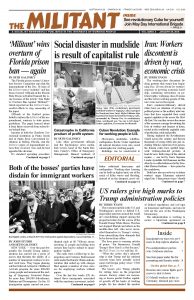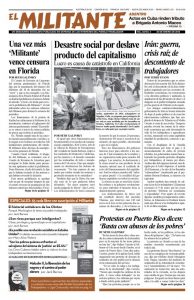VANCOUVER, British Columbia — Over 1,100 people died from drug overdoses in this province in 2017. More than 80 percent of the deaths have been linked to fentanyl, a powerful synthetic opioid that is wreaking havoc in areas hard hit by the effects of the capitalist economic and social crisis across North America.
In April 2016 Dr. Perry Kendall, British Columbia’s chief health officer, declared a “public health emergency” over the high number of overdose deaths, but the capitalist rulers have done nothing to address the underlying class realities responsible. The Vancouver Sun reported Sept. 27 that the British Columbia ambulance service had fielded 36,000 overdose calls in the previous 18 months.
These conditions are the result of the workings of today’s crisis of capitalist trade, production and employment. As members of the Communist League knock on doors in working-class communities to discuss the roots of this crisis, what we can do about it, and to build the League, we often hear how friends, co-workers and family members have been ravaged by the crisis.
Many workers use opioids because they face chronic pain as a result of a history of on-the-job injuries, or from military service in imperialist wars abroad. Fraser Health, which serves a wide expanse of southwestern British Columbia, says men between 19 and 59 years old who work in industry are disproportionately affected by the drug crisis.
People of indigenous descent are three times more likely to die of an overdose than people of non-indigenous descent.
Some capitalist politicians say the answer is more criminalization of those involved in drug sales and use. Mike Farnworth, British Columbia minister of public safety, is considering tougher penalties for fentanyl dealers, including charging them with manslaughter.
But the drug trade is just a business, like other capitalist businesses, with higher returns because of higher risks. It doesn’t go away. Repression simply forces drug users underground, criminalizing them, and makes getting treatment more difficult.
While social service agencies and medical personnel call for increased attention to this social crisis, none points to its roots in the dog-eat-dog capitalist system and the wars and social crises it breeds.
The British Columbia government is reopening Riverview psychiatric hospital in Coquitlam, a Vancouver suburb, as a mental health and addiction center, but at the same time is closing the Burnaby Centre for Mental Health and Addiction. The net result will be the addition of only 11 beds.
Hundreds of thousands of manufacturing jobs have been eliminated in Canada since the worldwide capitalist financial crisis exploded in 2007, forcing many workers who had relatively well-paid steady work into a series of lower-paying temporary or part-time jobs. Temporary work has grown 12 times faster than regular jobs for workers between the ages of 25 and 54. More and more workers are living paycheck to paycheck, unable to make ends meet.
Housing costs and rents are sky high in Vancouver and other major Canadian cities. Many workers struggle to keep a roof over their heads and those of their families. The health service is deteriorating, and workers with job injuries or health challenges lack support. Facilities are woefully inadequate for those struggling with mental illness.
The Communist League calls on the labor movement to mobilize working people in an ongoing social struggle to demand a government-funded public works program to provide tens of thousands of union-scale jobs to build hospitals, schools, day care centers, mental health clinics and other things workers need.
We can build on this fight to chart a course of independent working-class political action to overthrow capitalist rule and put a workers and farmers government in power. Through this struggle, working people will transform themselves, conquering the capacity to run society ourselves to meet human needs, not for capitalist profits.
Katy LeRougetel contributed to this article.

